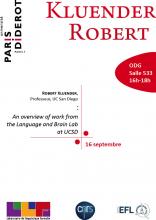An overview of work from the Language and Brain Lab at UCSD
Bâtiment Olympe de Gouges
5e étage, salle du conseil (533)
UFR Linguistique,
8, rue A. Einstein 75013 Paris
The Language and Brain (LAB) Laboratory in the UCSD Department of Linguistics has traditionally been devoted to the study of the relation between discontinuous sentence elements that depend on each other for their interpretation. If one of these elements has been displaced or deleted from its canonical position, the resulting configuration is usually referred to in the sentence processing literature as consisting of a filler, which provides the semantic content of the relation, and a gap, which provides critical syntactic information. Within this range of phenomena, our lab has focused primarily on the relationship between fillers and gaps in
- wh-questions
- relative clauses, and
- scrambling contexts
(so-called A-bar-movement phenomena) in English, German, Japanese, and Korean. We have also done some work on passivizationin English (a so-called A-movement phenomenon).
The notion of discontinuous sentence elements in a dependency relation can however also be extended to include such diverse phenomena as the relationship between:
- a wh-element in situ and its corresponding scope-marking question particle,
- a true (contentful) wh-phrase and a subordinate place-holding wh¬-scope-marker,
- a wh-question word and the focused element in a question/answer pair,
- a pronominal—either null or overt—and its antecedent,
all of which phenomena have been studied in our lab as well.
The study of East Asian all languages such as Japanese and Korean has also led us to investigate how the processing of gap-filler configurations, in which the gap precedes its filler, might differ from the processing of more familiar Filler-gap configurations in West Germanic languages like English, Dutch, and German.
Current projects in our lab extend the above research questions to include such things as whether the processing of:
- negative and universal quantification differs from that of wh-quantification
- true negation in yes/no-questions differs from that of pragmatic negation
- referential expressions differs from that of quantified expressions
- bound anaphors differs from that of free pronominals
In addition, we have ongoing projects that look into the nature of brain responses to word category violations and the implicit learning of grammatical distinctions.





